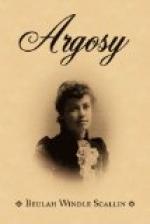Fred was organist at the parish church and had been composing songs, as we have seen. Most of them had come back to him accompanied by polite notes of refusal; one or two had come out and failed to attract any notice. Now, “Winged Love” was proving a success—so he had resolved to speak to Nancy herself, though not yet to the parents on either side.
It was a pity he didn’t take the straightforward course—it pays best, did people but know it. Had Fred Hurst gone to the house boldly that night, it might, as I have said, have saved much misery. Had he glanced through the uncurtained window of the “house-place,” I think he would certainly have gone in, for he would have seen Nancy in tears.
Mrs. Forest was a woman whose temper could not have been sweet under the best of conditions. It will be understood, then, that it developed into something very bad indeed under the worrying influence of a master like Mr. Hurst, who was never satisfied, and whose method of dealing with those he employed was one of incessant bullying. He was, moreover, subject to delusions about being cheated, and his suspiciousness was always in evidence.
This last fault was also one of Mrs. Forest’s own, and if anything a worse one than her bad temper, and was not infrequently the occasion of an exhibition of the latter. When Nancy got home from Miss Michin’s on the night when Fred Hurst tried to meet her, she found her mother in one of her worst moods. Mr. Hurst had been there all the morning, superintending the killing and packing of the turkeys for the London market. Nancy had made up her mind on her way home to ask her mother for a little money to buy herself some new gloves. She resolved to make her request at once on entering the house-place, where her mother was—partly from a desire to get what generally proved a disagreeable business over as soon as possible, and more, perhaps, because she saw her father sitting smoking his pipe in the chimney-corner. John Forest usually supported his daughter, who was a great favourite of his. He generally called her “Sweet Nancy,” because she was so pretty and dainty, and, above all, so good-tempered—a quality he knew how to appreciate.
“I was wondering, mother,” Nancy began hesitatingly, as she removed her hat and advanced towards the wood fire, above which Mrs. Forest was hooking-on a huge kettle of fowls’ food—“I was wondering if I might have some new gloves for Christmas.”
“And where, I should like to know, is the money for them to come from?” demanded the mother sharply. “I want lots of things I go without. It takes all I can scrape and spare to buy saucers for them chickens to break. It’s a shame of the master not to buy proper drinking dishes for them; and when I asked him for some, he said your father could dig a hole and sink the old copper-boiler in it, and fill that with water for them, just as if he hadn’t the sense to see as how every blessed chicken ’ud get drowned, and me be blamed for it, as usual.”




